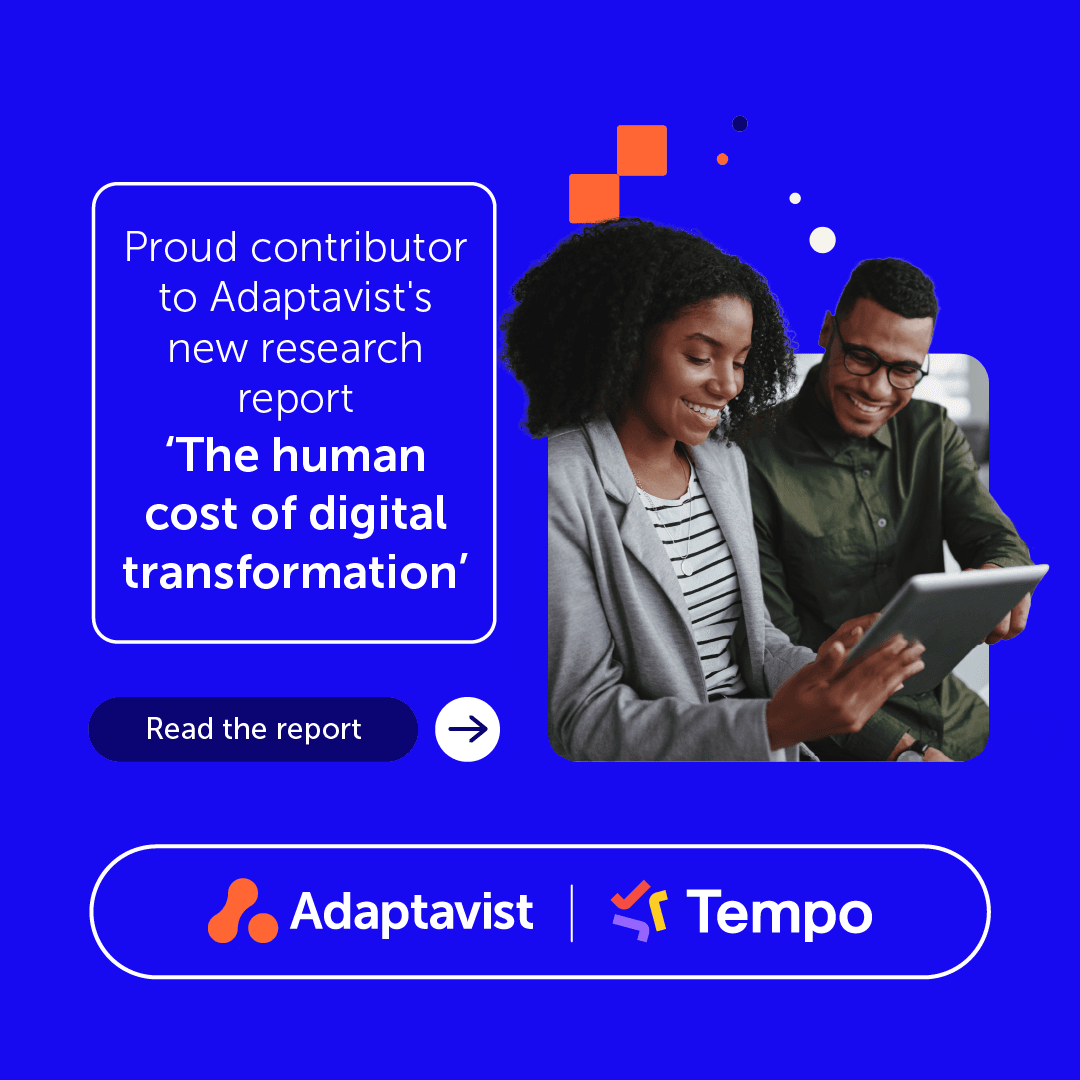Partner content: The ‘human’ cost of digital transformation
Tempo Team
Digital transformation is often lauded as a source of empowerment for workers, but it can actually be the downfall of successful teams. That’s a key insight from Adaptavist’s latest report, The ‘human’ cost of digital transformation.
Tempo contributed to the report, which surveyed 4,000 companies across Europe and North America. It focuses on how the drive for productivity and profit is leaving company culture and happiness behind – and how that damages our organizations.
For example, more than one in five respondents (21%) report that the lack of training on new tools directly drives stress and anxiety for them.
While the report emphasizes that new tools and processes for improving workflows can fuel growth and improve employee happiness, the side effects of poor tech implementation – like thrusting unwanted tools on teams – leads to a “quiet cracking” crisis.
Quiet cracking is when your employees suffer a steady decline in their motivation, well-being, and performance due to losing connection with their jobs, poor opportunities to develop, and bad management.
Tempo was proud to contribute to this report, as the human factor of digital transformation can often end up being overlooked. The people we should be trying to help when developing new tools are the workers using them, and productivity and profit flow from teams thriving – not just surviving.
This piece will cover a few of the key findings from The 'human' cost of digital transformation and what you can do to combat the quiet cracking that could be hurting your teams.

Technostress
One of the report's key points is the (unwanted) emergence of technostress in the workforce. Transformation can often be seen as only a positive for the leaders who won’t be using the tools – but an ever-changing work environment can make people feel unsettled.
Facing a constant demand to adapt to new tools and systems, trying to stay in the loop with new technical jargon, and tensions on how AI and new technologies threaten job security and role definition are all key factors in a technostressed person.
Technostress data
74% saying corporate buzzwords like ‘KPIs’, ‘efficiency’, and ‘action items’ make them disengage, and 39% expressing frustration with such terminology several times a week.
60% of workers worry about losing knowledge when colleagues leave, and over a third are simultaneously hoarding their own expertise out of fear of AI replacement.
74% of knowledge workers often don't know why they are working on a task.
Almost a fifth of workers (19%) feel pressure to remain connected outside of their contracted hours.
It isn’t hard to imagine how this can all build up to make for an unhappy team – and unhappy teams don’t work effectively, meaning all the investment you make in digital transformation goes out the window when there is no one to with the drive to use the new tools.
Not all doom and gloom
These issues aren’t inherent problems with implementing tech or digital transformation: They stem from systematic neglect at the intersection of technology, communication, and workplace culture.
While the data highlights that unchecked technostress can cause considerable damage, the same research points to a solution: Clarity, autonomy, and a supportive culture around technology can reverse the tide.
Our chief product officer, Shannon Mason, contributed her own experience on managing this.
“When organisations implement flexible solutions that guide without dictating, workers gain greater autonomy, motivation, and even career acceleration,” said Mason. “The next generation of work platforms must replace rigidity with adaptability – giving teams the clarity, balance, and freedom they need to thrive while letting AI and orchestration amplify human potential, rather than overwhelm it.”
Workplace tools should be primarily seen as ways to improve the experience of our employees and enable human potential – not just promoted to our teams as ways to “make line go up and to the right.”
The report covers a number of ways that leaders can make digital transformation work for their teams, from training to culture. It also highlights many other factors, such as helping your employees understand the “why” in their work, getting teams aligned with new tools, and overcoming the fear of AI.
Tech is an inescapable part of our workplace, so we need to make it work. This Adaptavist report is packed with useful information for any modern business leader, reflections from experts in the field, and practical solutions to combat the issues raised from the data.
Get the free report – no sign-up required










































